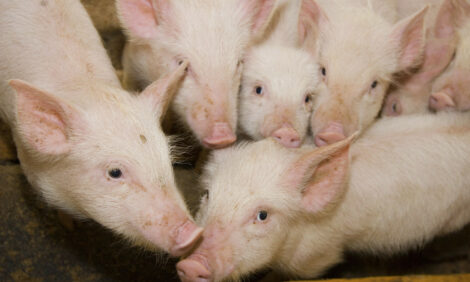



Study: PRRS 1-4-4 L1C variant strain virulence
Anorexia, lethargy, fever and mortality result from the PRRS 1-4-4 L1C variant virusA porcine reproductive and respiratory syndrome virus (PRRSV) 1-4-4 L1C variant strain emerged in the USA in October 2020 and has spread widely, causing high production losses based on field observations.
However, no unequivocal experimental data was available to determine the virulence phenotype of the 1-4-4 L1C variant, said Jianqiang Zhang, Iowa State University, presenting research with weaned pigs at the 2022 Leman Swine conference.
In an experimental study, the virulence and transmissibility of the 1-4-4 L1C variant strain was characterized in comparison with three other circulating 1-4-4 strains — L1C non-variant, L1A and L1H— and one highly virulent 1-7-4 L1A strain, he said.
Seventy-two 3-week-old PRRSV-naïve pigs were divided into 6 groups with 12 pigs per group. Forty-eight pigs (8 per group) were inoculated while 24 pigs (4 per group) served as contact pigs. After one week acclimation, pigs were inoculated with the corresponding virus or negative media intramuscularly and intranasally, Zhang said.
At 2 days post inoculation (DPI), contact pigs were added to the pen adjacent to the inoculated pigs in each room. Serum and oral fluid samples were collected at 0, 2, 4, 7, 10, 14, 21 and 28 DPI. Pigs were necropsied at 10 and 28 DPI. Fresh and formalin-fixed tissues were collected at necropsy for examinations. For all analyses, SAS was used and a p-value ≤ 0.05 was considered significant, Zhang explained.
Inoculation effects
The 1-4-4 L1C variant-inoculated pigs became more anorectic and lethargic, had higher mortality, had higher percentage of pigs with fever (>40°C) during 0-10 DPI, and had significantly higher average body temperature than other virus inoculated groups at several DPIs, he said.
The 1-4-4 L1C variant-inoculated group had significantly higher viremia levels compared to all other groups at 2 DPI. There were more severe gross lung lesions in the 1-4-4 L1C variant-inoculated group compared to others except the 1-7-4 L1A group at 10 DPI, Zhang said.
Concluding his presentation, Zhang said that the data on clinical signs, mortality, body temperature, viremia levels and gross lung lesions confirm that the 1-4-4 L1C variant is highly virulent in weaned pigs. The higher number of contact pigs becoming viremic at 2 days post contact implies the L1C variant strain may have higher transmissibility than other PRRSV strains, although that still needs to be confirmed.







